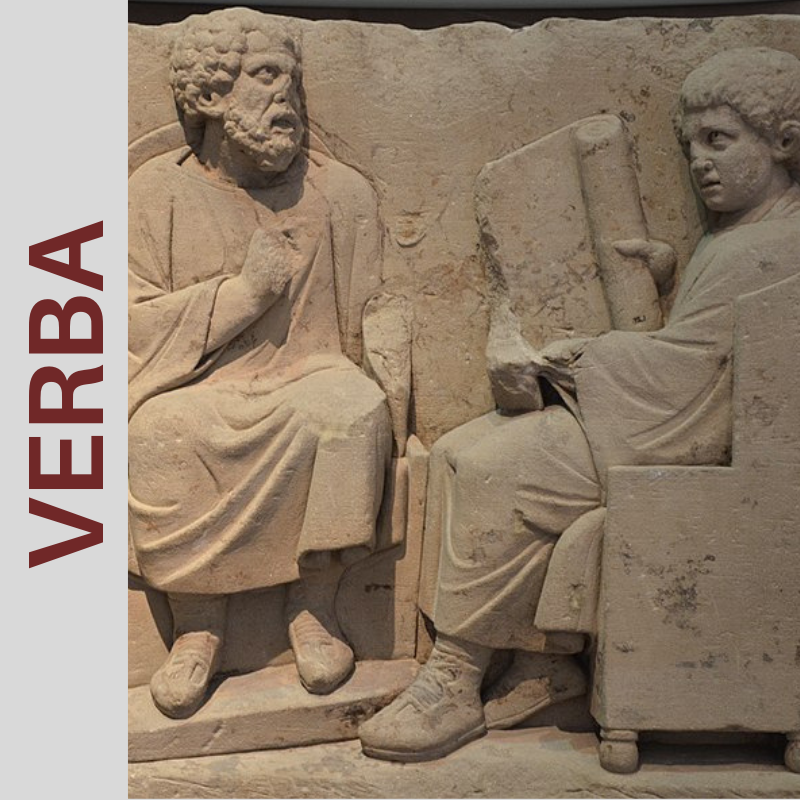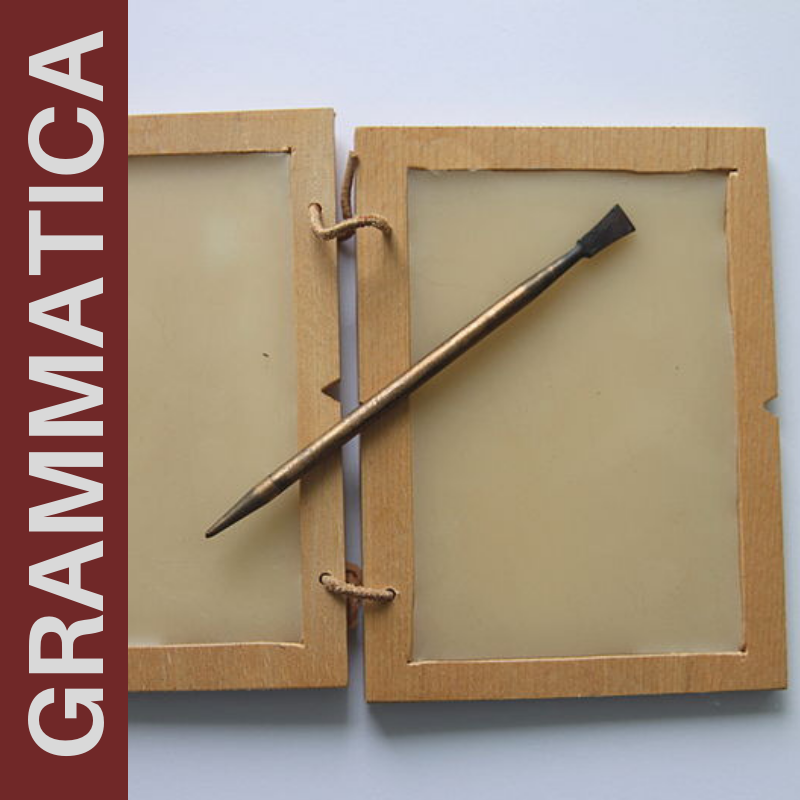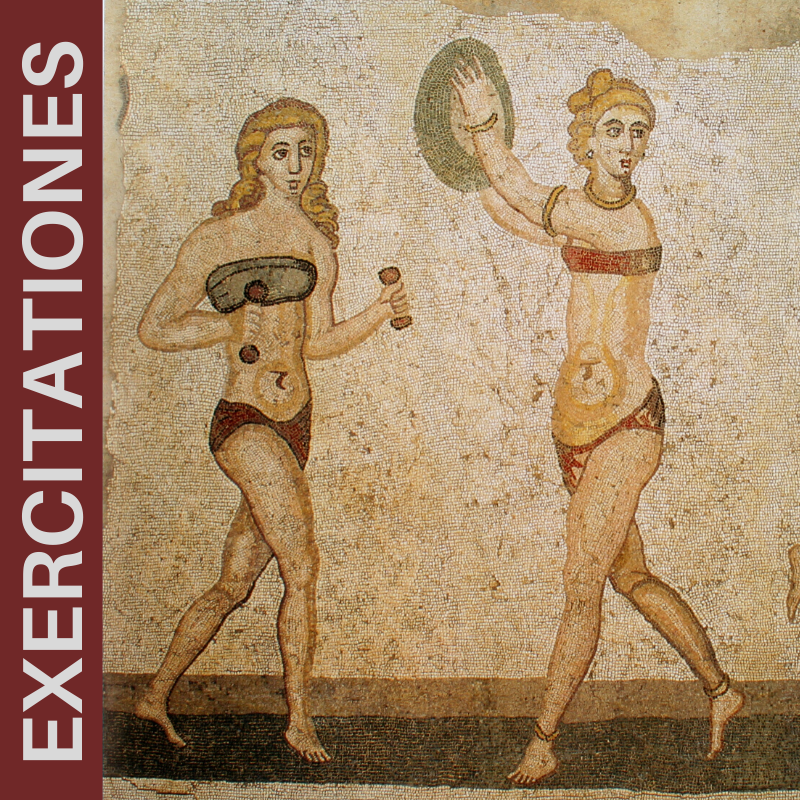Verbs
First Conjugation
hortor, hortārī, hortātum - to urge strongly, advise, exhort
precor, precārī, precātum - to pray, invoke
stō, stāre, stetī, statum - to stand
praestō, -stāre, -stitī, -stātum - to excel, exhibit
Second Conjugation
doceō, docēre, docuī, doctum - to teach (+ double acc. of person and thing)
fleō, flēre, flēvi, flētum - to weep
gaudeō, gaudēre, gāvīsum - to rejoice (semi-deponent, + abl.)
studeō, -ēre, -uī - to be eager, be zealous, care for (+ dat.)
taceō, -ēre, -uī, -itum - to be silent
terreō, -ēre, -uī, -itum - to terrify, frighten
valeō, -ēre, -uī, -itum - to be strong, excel; (in the imperative) farewell!
videor, vidērī, vīsum - to seem, to seem best (passive of videō, + dat.)
Third Conjugation -ō
addō, -dere, -didī, -ditum - to give to (ad • dō, dare, dedī, datum)
agō, agere, ēgī, āctum - to drive, do, act; to spend (referring to time)
cōgō, cōgere, coēgī, coāctum - to drive together; to compel
canō, canere, cecinī, cantum - to sing
condō, -dere, -didī, -ditum - to build, found; to store up; to hide, conceal (con • dō, dare, dedī, datum)
discō, discere, didicī - to learn
dūcō, dūcere, dūxī, ductum - to lead
dēdūcō, -dūcere, -dūxī, -ductum - to launch, lead away
ēdō, -dere, -didī, -ditum - to put forth, state, explain (ē • dō, dare, dedī, datum)
legō, legere, lēgī, lēctum - to gather, choose, read
ēligō, ēligere, ēlēgī, ēlēctum - to pick out, select
loquor, loquī, locūtum - to speak, talk
perdō, -dere, -didī, -ditum - to destroy (per • dō, dare, dedī, datum)
reddō, -dere, -didī, -ditum - to return, give back (red • dō, dare, dedī, datum)
sequor, sequī, secūtum - to follow
trādō, -dere, -didī, -ditum - to hand over, yield (tra[ns] • dō, dare, dedī, datum)
Third Conjugation -iō
ēgredior, ēgredī, ēgressum - to stride out, depart, disembark from (+ abl.) (ē • gradior, gradī, gressum)
ingredior, -gredī, -gressum - to step in, enter (in • gradior, gradī, gressum)
morior, morī, mortuum - to die
Fourth Conjugation
orior, orīrī, ortum - to arise, begin
Nouns
First Declension
causa, -ae f. - cause, reason; causā + preceding genitive, for the sake of
disciplīna, -ae f. - training, instruction; discipline
fābula, -ae f. - account, tale, story
hōra, -ae f. - hour
sententia, -ae f. - opinion, judgment
turba, -ae f. - crowd, uproar
Second Declension
annus, -ī m. - year
liber, librī m. - book
magister, magistrī m. - master, teacher
mūrus, -ī m. - wall
puer, puerī m. - boy; enslaved boy or young man
Third Declension
ars, artis f. - skill
carmen, -inis n. - song, poem
dolor, -ōris m. - pain, grief
error, -ōris m. - wandering; error, mistake
furor, -ōris m. - rage, fury
homō, hominis m. - human being
ignis, -is m. - fire
iuvenis, -is m. - youth, young man
mēns, mentis f. - mind
nāvis, -is f. - ship
ōrātiō, -ōnis f. - speech, address
tempus, -oris n. - time
voluptās, -tātis f. - pleasure, enjoyment
Adjectives
First and Second Declension
dūrus, -a, -um - hard, tough, harsh
laetus, -a, -um - glad, joyful
malus, -a, -um - bad, evil
miser, misera, miserum - wretched, pitiable
nōtus, -a, -um - well-known
pius, -a, -um - dutiful, pious
prīmus, -a, -um - first
pūblicus, -a, -um - public, belonging to the state
secundus, -a, -um - following; favorable; (as numeral) second
tantus, -a, -um - so great, so much
vērus, -a, -um - true
Third Declension
dulcis, -e - sweet
sapiēns, (gen. sapientis; abl. sgl. either -i or -e) - wise; (as subst.) wise man, sage, philosopher
Prepositions
apud - near, in the presence of (+ acc.)
contrā - against, opposite (adv. and prep. + acc.)
inter - between, among; during (+ acc.)
ob - against, on account of (+ acc)
sine - without (+ abl.)
Adverbs
bene - well
hodiē - today
nōndum - not yet
prīdiē - on the day before, the previous day
quippe - indeed, surely (adv. and conj.)
sīc - in this manner, thus
tum or tunc - then
unde - from where
Conjunctions
cum - when
dum - while
enim - for, indeed
nam or namque - for, indeed, really





